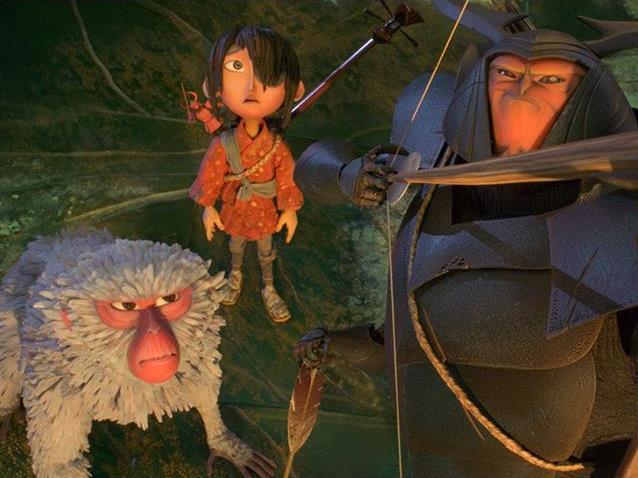Kubo and the Two Strings image via Universal Pictures.
In a crowded cinema landscape overflowing with stories about attempted acts of gallantry, tales of outsiders turned unintentional heroes remain among the most frequently told. And yet, in the hands of ParaNorman and The Boxtrolls lead animator turned first-time feature helmer Travis Knight, little about tender stop-motion adventure Kubo and the Two Strings proves worn or wearied, except by design. Indeed, as the film’s style of imagery takes its cues from origami – and as transforming sheets of paper remain integral on screen as well – the movie always showcases just the right amount of creases and folds in its plot, visuals and emotions.
That the feature’s lead character is a one-eyed 12-year-old boy navigating a loving but sparse and sheltered existence accounts for much of the lived-in texture central to the film, at least where sentiment is involved; Kubo’s (Art Parkinson, TV’s Game of Thrones) life mightn’t be lacking in affection, but it isn’t easy, with the bond he shares with his ailing mother forced to stretch far enough to compensate. That his mum is a god who sparked a family feud when she decided to marry a mere mortal provides the impetus for much of the rest, including the delicate yet slightly – and purposefully – frayed sheen of movie’s animation.
The script by Marc Haimes (Johnny Frank Garrett’s Last Word) and Chris Butler (ParaNorman) based on a story by Haimes and Shannon Tindle (Foster’s Home for Imaginary Friends); the narrative’s blend of mythical familiarity and everyday intricacy, not only sits at the heart of Kubo and the Two Strings but embodies its earnest message about embracing and reshaping the recognisable. With the assistance of offsiders Monkey (Charlize Theron, The Huntsman: Winter’s War) and Beetle (Matthew McConaughey, Free State of Jones), Kubo seeks a magical coat of armour that can protect him from the wicked ways of his grandfather, the Moon King (Ralph Fiennes, A Bigger Splash), and spiteful twin aunts, the Sisters (Rooney Mara, Carol). Gifted at relating tales and keen to cling to fond memories, in the process he realises the value of both.
After a patient start, a gorgeous and generous film results, its charms and sources of contemplation plentiful — and not simply of the uplifting kind. Nestled within this thoughtful fable about the power of storytelling is a deep spring of melancholy, with Knight eager to stress the importance of everything that lingers beyond laughs and smiles. If that seems somewhat brave in an effort aimed at all ages, that’s because it is; it’s also steeped in the Japanese samurai tradition the movie overtly favours, as well as the similarly pensive, poignant, and pleasant blend that beloved animation house Studio Ghibli have perfected for decades. Here, hard topics are touched upon with care and grace that stems not from avoiding life’s harsher truths, but from emphasising the need for accepting and learning from trying times.
Such a focus on balancing lighter and darker emotions also manifests in Kubo and the Two Strings‘ aesthetics, which succeed in thrusting both into the cinema in painstaking detail. As elaborate figures and creatures bound across the screen, vibrant colours swell against gloomy horizons, making a simple but strong statement. Acoustically, the soulful tones of the high-profile central voice cast capture the highs and lows of their various battles with nuance that can delight and devastate with the slightest change of tone. Of course, it’s this fragile line between happiness and sorrow that the disarming film conveys best as it weaves a seemingly typical hero’s journey into something enchantingly wise, warm, layered and knowing.
Rating: 4 stars out of 5
Kubo and the Two Strings
Director: Travis Knight
USA, 2016, 101 mins
Release date: August 18
Distributor: Universal Pictures
Rated: PG
Actors:
Director:
Format:
Country:
Release:





